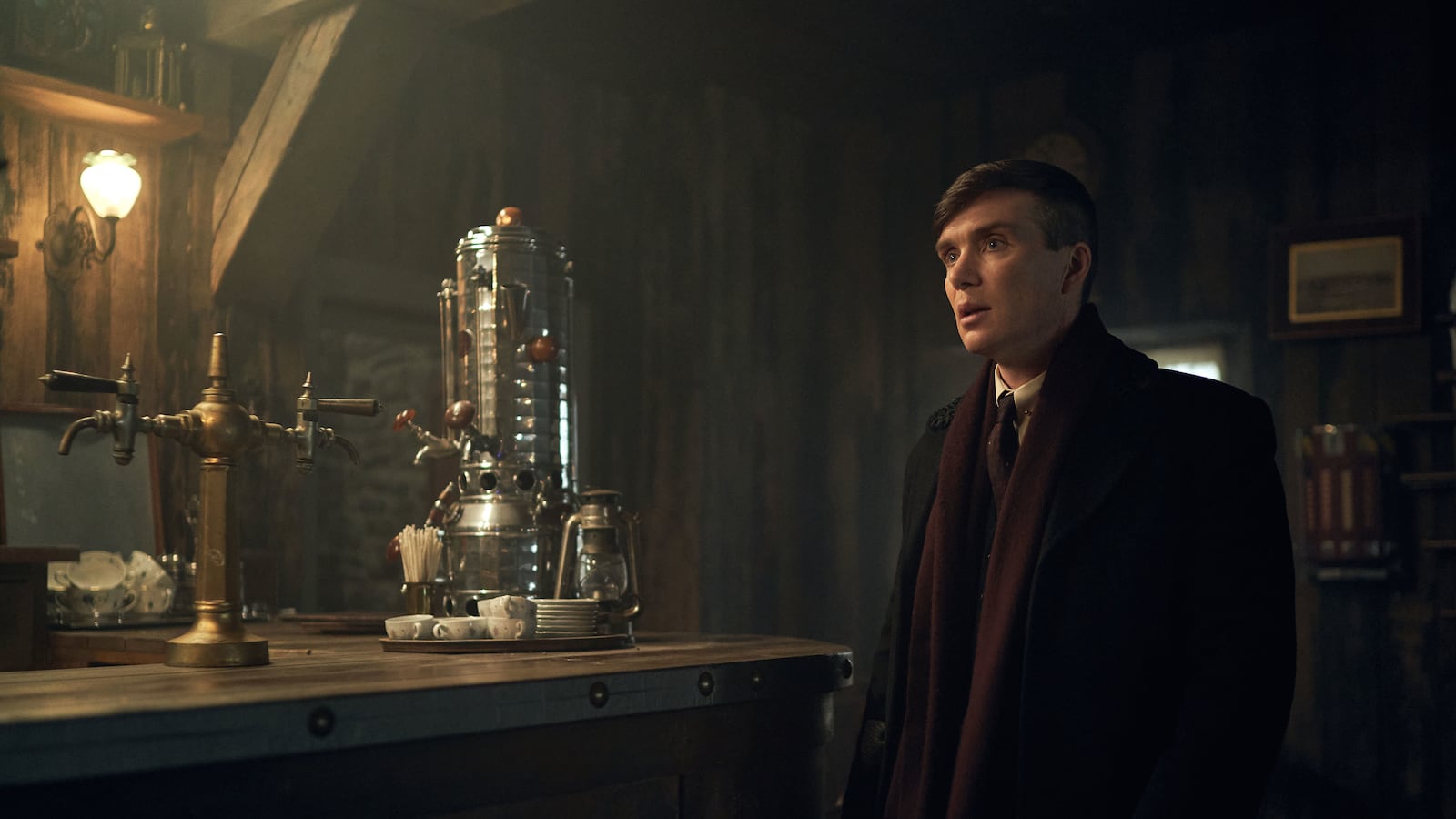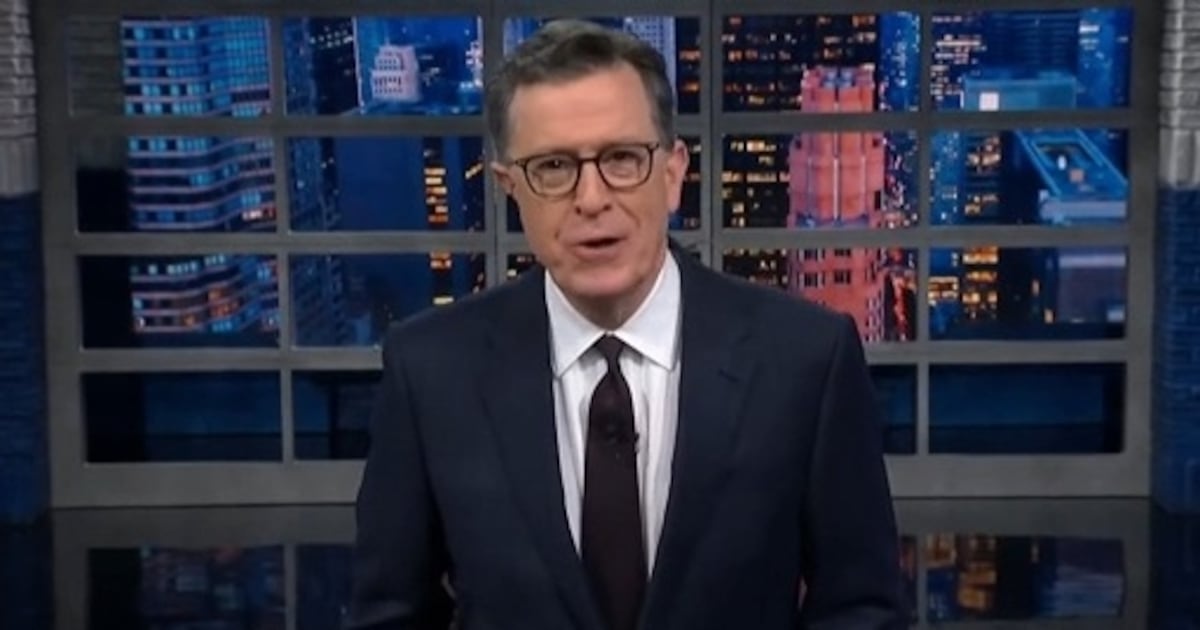Tommy Shelby (Cillian Murphy) rises from the ground, his face half clean and half blackened with mud, at the start of Peaky Blinders’ sixth and final season, a visual encapsulation of the Peaky Blinders boss’ continuing war between his light and dark sides. That conflict remains the crux of Steven Knight’s immensely popular British gangster series, whose largely thrilling and satisfying six-part conclusion (debuting on Netflix June 10) finds Tommy once more resurrecting himself in order to straighten out the mess he’s made—in this case, his Season 5 failure to assassinate rancid British Union of Fascists bigwig Sir Oswald Mosley (Sam Claflin), which has resulted in the killing of his beloved Aunt Polly (Helen McCrory).
Driven by the untimely real-life passing of McCrory in 2021, Polly’s death proves the catalyst for Peaky Blinders’ small-screen wrap-up. Four years after this 1929 calamity, Tommy has given up whiskey in an act of turning over a new leaf and leaving his lethal underworld ways behind. Regardless, Polly’s son Michael (Finn Cole) blames Tommy for his mother’s murder and is hell-bent on revenge. With American prohibition coming to an end, Tommy and Michael meet on Miquelon Island—where French bootleggers earned a tidy profit running booze to and from the States—and strike an uneasy alliance to re-employ these ferrymen to smuggle their opium into the U.S. To do this, Tommy and Michael need the okay of Jack Nelson (James Frecheville), a South Boston kingpin who’s the uncle of Michael’s wife Gina Gray (Anya Taylor-Joy). Yet to maintain the upper hand in these negotiations, Tommy swiftly frames Michael and lands him in jail, thus allowing him to deal with Nelson himself.
Peaky Blinders has always pivoted around Murphy’s magnetic performance as Tommy, a crook whose noble designs—which have led him to become a socialist member of parliament who fights for the working class of his Birmingham hometown—are at perpetual odds with his amoral behavior. Throughout this season, Tommy repeatedly states, “I have no limitations,” and the sentiment is at once true and something he tells himself to bolster his confidence as he charts his latest perilous course. At the top of his priorities is the aforementioned opium deal, which necessitates wooing Nelson, who soon arrives on English shores looking to secure profitable new liquor licenses. However, given that Nelson is a not-so-covert Nazi sympathizer whose main objective on this trip is to learn (on behalf of President Roosevelt) how close Britain is to tipping toward fascism, Tommy’s business with Nelson also invariably involves Mosley, who—along with his evil mistress Lady Diana Mitford (Amber Anderson) and IRA official Laura McKee (Charlene McKenna)—is striving to solidify European support for Hitler’s new world order.
Tommy therefore gets back into bed with villains—sometimes literally—as a necessary means of facilitating his ends, all while simultaneously endeavoring to toe the teetotaling line. Unsurprisingly, Peaky Blinders doesn’t make things easy for its protagonist, saddling him with a domestic tragedy that rocks his stability and sense of surety, as well as familiar troubles with his brother Arthur (Paul Anderson), an opium-addicted drunkard who’s spending his days and nights in a state of constant inebriation. Far from the bellowing braggart of the past, Arthur is now in full degradation mode, and if that drains the character of some of his bellowing charisma, he’s still the sorrowful heart of the show, his self-loathing so crushing that it amplifies the pall hovering over the proceedings.
Doom is approaching from all directions in Peaky Blinders’ final installments, and Tommy believes it to be the byproduct of his cursed nature—a notion that eventually sends him into the English mountains in search of Esme (Aimee-Ffion Edwards), the gypsy widow of Tommy’s slain brother John, whom he hopes has a remedy for his problems. Tommy is split between the civilized and the wild, the calm and the brutal, the rational and the mystical, and the good and the bad, and Murphy embodies him with his usual fearsomeness and volatility, the last of which is exacerbated by both his lingering WWI PTSD and the guilt he feels for the many people whose deaths he’s directly or indirectly caused. Murphy’s stellar turn has made Tommy a fascinating figure of ruthless ambition and tortured regret, and his belief in doing wrong to achieve right—in this case, to leave his family financially well-off and to build affordable housing for the downtrodden—is what makes him so compelling.
Considering that creator/writer Steven Knight has already announced a follow-up feature film, Peaky Blinders’ close lacks a bit of suspense; no matter how much peril Tommy seems to be in, it’s impossible to truly believe he might meet his maker. Everyone else, though, is on the proverbial chopping block, including Taylor-Joy’s scheming Gina, Sophie Rundle’s formidable Ada, Natasha O’Keeffe’s long-suffering Lizzie, or Tom Hardy’s loquacious Jewish gangster Alfie Solomons, the show’s ace scene-stealer, who materializes at unexpected intervals to engage in hilarious bouts of rambling, florid verbosity. Consequently, there’s considerable tension throughout, with Knight and director Anthony Byrne maintaining intrigue and delivering twists with requisite dexterity, all as they stick to the show’s formal hallmarks—namely, jingly-jangly guitar, sets drenched in mist and smoke, and innumerable shots of characters strutting in slow-motion to and from the camera.
As it approaches the end, Peaky Blinders doesn’t deviate from its chosen path, and that’s ultimately its biggest strength and its greatest weakness. After so many instances of Tommy turning the tables on his adversaries at the last minute via some cunning, clandestine plot, his final showdown with Michael and company plays out in borderline-predictable fashion. Nonetheless, it’s not the destination so much as the journey with Peaky Blinders, which has forever been most entertaining when simply reveling in the camaraderie of the unruly Shelby clan, the cock-of-the-walk cool and screwy torment of Tommy, and the particularly British slang and style of the Peaky Blinders themselves, a gang whose signature haircuts, outfits, chain-smoking, whiskey-guzzling and furious braggadocio have by now become iconic. There’s plenty more where that came from in this last six-episode stretch—and, it appears, also in the sure-to-be violent future that lies beyond it.







